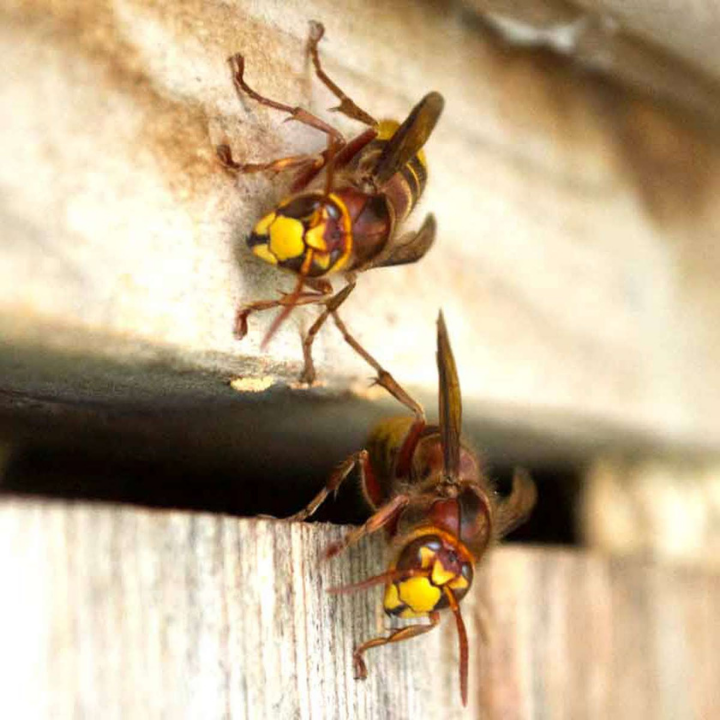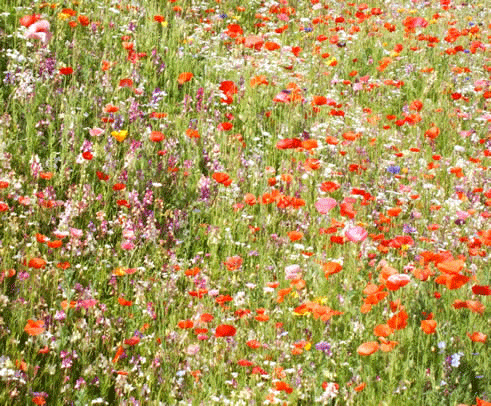Last Updated: June 30, 2025
European hornets (Vespa crabro), the largest native social wasps in the UK, are a striking yet often misunderstood presence in Bristol’s woodlands, gardens, and urban areas. For Bristol residents who may enjoy gardening, outdoor activities, or maintaining their properties, understanding these insects is key to coexisting safely and managing potential risks. This comprehensive guide explores the biology, behaviour, and ecological role of European hornets, supported by scientific research, and provides practical advice for safe control, linking to expert services at Pale Horse Pest Control.
What Are European Hornets?

European hornets are the UK’s only native true hornet species, belonging to the genus Vespa within the Vespidae family. Measuring 25–35 mm (workers 25 mm, queens up to 35 mm), they dwarf common wasps like Vespula vulgaris. Their distinctive reddish-brown and yellow stripes, C-shaped eyes, and loud, buzzing flight make them unmistakable. Often mistaken for the invasive Asian hornet (Vespa velutina), European hornets are larger, with a brown thorax and thicker yellow abdominal bands, unlike the Asian hornet’s darker body and yellow-tipped legs.
These eusocial insects live in colonies of 200–400 workers, led by a queen. They build intricate paper nests from chewed wood and saliva, typically in hollow trees, lofts, or sheds. Unlike common wasps, they are active day and night, attracted to light, which can lead them into homes during summer evenings.
Scientific Insight: Research highlights their unique reproductive suppression via worker policing rather than queen pheromones, a trait distinguishing them from other vespines. Their nests, composed of non-uniform plant fibres, are engineering marvels, often enveloped to maintain darkness.
European Hornets in Bristol: Distribution and Habitat

Bristol’s diverse landscapes—woodland valleys like Gordano, Abbots Leigh, and Failand, plus urban parks and gardens—provide ideal habitats for European hornets. Once declining in the 20th century, their populations have rebounded, making sightings common from May to November. Hollow trees, roof spaces, and garden sheds are frequent nesting sites.
Local Observations: Pest control experts, including Pale Horse Pest Control, note that Bristol’s mix of rural and urban environments supports hornet colonies. Warm summers and abundant insect prey, like beetles and moths, fuel population growth. Climate influences generation time, with eggs maturing in as little as a week during hot weather, leading to larger colonies.
Ecological Role and Benefits

European hornets are vital to Bristol’s ecosystems. As carnivorous predators, they hunt garden pests like caterpillars, flies, and smaller wasps, reducing the need for chemical pesticides. They also pollinate wildflowers and garden plants while foraging for nectar, supporting biodiversity. Their scavenging of carrion and decaying matter recycles nutrients into the soil.
Scientific Data: Studies show European hornets prey on a wide range of insects, including western honey bees (Apis mellifera), but they pose minimal threat to healthy bee colonies compared to Asian hornets. Their kleptoparasitic behaviour, such as stealing prey from spiders, demonstrates their adaptability.
For Bristol gardeners, hornets can be allies, controlling pests that damage crops and flowers. However, their presence near homes requires careful management to avoid conflicts.
Behaviour and Sting Risks

European hornets are less aggressive than common wasps, stinging only when threatened or defending their nests. Their stings, while painful due to high acetylcholine levels, are 1.7–15 times less toxic than honey bee venom. Unlike bees, their non-barbed stings allow multiple strikes. Allergic reactions, including anaphylaxis, are rare but serious, particularly for older adults with sensitivities.
Safety Tips:
- Avoid sudden movements, vibrations (e.g., lawnmowers), or breathing directly on nests, especially within 3 meters.
- Keep windows closed on summer evenings to prevent hornets from entering homes.
- If stung, clean the area, apply a cold compress, and seek medical attention for swelling or breathing difficulties.
Research Note: The hornet’s venom is designed to subdue prey, not harm humans, explaining its lower toxicity. However, individual reactions vary, and professional intervention is advised for nest-related concerns.
Managing European Hornet Nests in Bristol
Hornet nests, often hidden in lofts, wall cavities, or trees, can cause structural damage if untreated. Waste piles beneath nests may lead to water damage, costing hundreds to repair. While hornets are protected in some countries (e.g., Germany, with fines up to €50,000 for nest destruction), UK regulations allow control when nests pose risks.
Professional Control: Pale Horse Pest Control offers BPCA-certified hornet and wasp control services in Bristol. Their same-day treatments, often completed in 10–60 minutes, use targeted insecticides to eliminate colonies safely. For environmentally conscious residents, nest relocation is an option where feasible, preserving hornets’ ecological benefits.
Why Avoid DIY?:
- Disturbing nests can trigger aggressive swarming, risking multiple stings.
- Incorrect treatments may harm non-target species, like bees, which are often mistaken for hornets.
- Professional expertise ensures compliance with safety and environmental standards.
Case Study: In 2023, Pale Horse Pest Control reported clusters of hornet nests in Bristol lofts, often reusing the same spaces year after year. Their local knowledge allows rapid response, often within an hour, minimising risks to residents.
Distinguishing European Hornets from Asian Hornets
Confusion with the invasive Asian hornet is common. Asian hornets, first sighted in the UK in 2016, threaten pollinators like honey bees, killing 30–60 daily per hornet. Bristol residents should report suspected Asian hornet sightings via the Asian Hornet Watch app to protect local biodiversity.
Identification Guide:
- European Hornet: 25–35 mm, reddish-brown thorax, thick yellow abdominal bands, brown legs.
- Asian Hornet: 20–24 mm, dark abdomen with one yellow segment, yellow-tipped legs.
Community Action: Bristol Beekeepers and the National Bee Unit urge vigilance, especially in summer when Asian hornet activity peaks. Early reporting prevents establishment, as seen in 2023 when 78 nests were destroyed in South East England.
Frequently Asked Questions (FAQ)
1. Are European hornets dangerous in Bristol?
European hornets are generally docile unless provoked or their nest is disturbed. Their stings are painful but less toxic than honey bee venom. For older adults with allergies, stings can cause anaphylaxis, requiring immediate medical attention. Contact Pale Horse Pest Control for safe nest removal.
2. How can I tell if I have a European hornet nest on my property?
Look for increased hornet activity, loud buzzing, or a paper-like nest in lofts, sheds, or trees. Nests are greyish-brown and may cause structural damage if untreated. Pale Horse Pest Control offers inspections to confirm and treat nests.
3. What should I do if I find a hornet nest?
Do not disturb the nest, as this can trigger aggressive swarming. Keep a safe distance (at least 3 meters) and contact professionals like Pale Horse Pest Control for safe removal or relocation.
4. Can European hornets be relocated instead of killed?
Yes, in some cases, nests can be relocated to preserve their ecological benefits. This requires expertise and a suitable site. Pale Horse Pest Control can assess feasibility based on nest location and environmental considerations.
5. How do European hornets differ from Asian hornets?
European hornets are larger (25–35 mm), with a reddish-brown thorax and thick yellow bands. Asian hornets are smaller (20–24 mm), with a dark abdomen and yellow-tipped legs. Report Asian hornet sightings via the Asian Hornet Watch app.
6. Are European hornets protected in the UK?
Unlike in Germany, where killing hornets incurs fines up to €50,000, the UK has no specific protections. However, control should be humane and environmentally responsible. Pale Horse Pest Control follows BPCA guidelines for ethical treatment.
7. How much does hornet nest removal cost in Bristol?
Costs vary based on nest size, location, and urgency. Pale Horse Pest Control offers competitive rates, starting from £105.00, with same-day service. Call 0117 369 9909 for a quote.
8. Can I prevent hornets from nesting on my property?
Seal entry points to lofts and sheds, keep bins covered, and avoid leaving sugary foods outdoors. Regular inspections by Pale Horse Pest Control can identify risks early.
9. Do European hornets harm bees?
They prey on honey bees occasionally but pose minimal threat to healthy colonies, unlike Asian hornets. Supporting local beekeepers and reporting Asian hornet sightings helps protect Bristol’s pollinators.
10. When are European hornets most active in Bristol?
They are active from May to November, peaking in summer. Nighttime activity, especially near lights, is common. Pale Horse Pest Control offers 24/7 emergency services for urgent cases.
Why Choose Pale Horse Pest Control?
With nearly 20 years of experience, Pale Horse Pest Control is Bristol’s trusted choice for hornet and wasp control. Their BPCA-accredited team, led by experts in conservation science and environmental health, combines local knowledge with scientific precision. Services include:
- Same-Day Response: Often on-site within an hour.
- Guaranteed Results: Treatments eliminate colonies effectively.
- Eco-Friendly Options: Nest relocation, where possible.
- Comprehensive Inspections: Identify and prevent future infestations.
Contact: Call 0117 369 9909 or visit Pale Horse Pest Control to book an inspection today.
Conclusion
European hornets (Vespa crabro) are a fascinating part of Bristol’s natural heritage, balancing ecological benefits with potential risks. For residents, understanding their behaviour and knowing when to seek professional help ensures safety and peace of mind. Whether you’re a gardener appreciating their pest control or a homeowner facing a nest, Pale Horse Pest Control offers expert solutions tailored to Bristol’s unique environment.
Call to Action: Don’t let hornets disrupt your summer. Contact Pale Horse Pest Control at 0117 369 9909 or visit their Wasp Nest Removal page for fast, reliable service.
